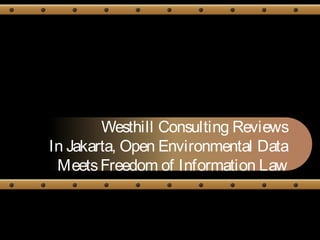
westhill consulting reviews: In Jakarta, Open Environmental Data Meets Freedom of Information Law
- 1. Westhill Consulting Reviews In Jakarta, Open Environmental Data MeetsFreedom of Information Law
- 2. Recently something interesting happened in Jakarta. Wegot aglimpseof what thefutureof theopen datamovement could, and hopefully will, look like. So what happened? On thesurface, nothing that would ordinarily send anyone’sheartsracing. Therewasaregional meeting of STRIPE, agroup dedicated to Strengthening theRight to Information for Peopleand theEnvironment. Theattendees, who hailed from China, Indonesia, Japan, Mongolia, the Philippines, and Thailand included representativesfrom civil society organizations, academia, governments, and international organizations. So hereisthefirst interesting piece. At theconclusion of theconference thegroup issued adocument they referred to astheJakartaDeclaration in which they cited not just freedom of information laws, but also open data, ascritical to tackling theregion'senvironmental challenges.
- 3. Consider the first three clauses of the declaration (italics mine): 1.FOI laws assist in ensuring access to environmental information by people and communities.However, information on air and water quality and pollutants released into the environment needs to be released proactively, in formats that are easily understandable by the public, without a request. 2.Government needs to adopt legal requirements for the collection and production of environmental information. 3.Laws that guarantee a specific right of access to environmental information without a requestneed to be operationalized to ensure quick and timely access to environmental information.
- 4. Thisfor meisawindow into afuturewherecallsfor open datano longer comestrictly from traditional advocates. In many waysthiswill beasign of success. Thefact that environmentalistsbelieveopen datacan help advancetheir causeisavalidation of theideasof open dataadvocates. At thesametime, I’m under no illusionsthat every new stakeholder will be asbenign or operating in thepublic interest as, say, environmentalists, but thisisnonethelessasign of maturity. Theopen datamovement wasonly ever going to get so far if it wasabout anarrow group of technologistsor transparency advocatesthat frequent thesameconferences. To succeed it needsto find supportersacrossmany groupsand bodiesand theJakarta Declaration isaperfect exampleof abridgebeing built to the environmental movement. It will beinteresting to what other bridgeswill emergein thecoming months.
- 5. The biggerstory Thereisabigger story however in theJakartaDeclaration, one I’vetried to talk about before. It isabout thedueling naturesof FOI and Open Dataand asecond way in which theopen data movement will haveto mature. Takealook at clausetwo again: 2. Government needsto adopt legal requirementsfor the collection and production of environmental information. Thisisessentially asking for alegal structurefor open environmental data. Thisisasignificant shift since, in many places, open dataenjoysno legal protection. In almost every jurisdiction, at any time, agovernment can removeand stop sharing adataset at which point it would only becomeavailable viaaFOI request. In other words, barring afew legislated examples, weenjoy easy accessto open dataat thepleasureof thegovernment.
- 6. Thisisoneof thecentral differencesbetween FOI and open data. FOI providescitizenswith rightsto access. Open data, for themost part, has simply afforded aprivilege. Our colleaguesin Jakartahaverightly pointed out their discomfort with thisand aregiving theopen datacommunity — which, asabroad tent, hasalwaysincluded thoseinterested in not just transparency, but non-profit, commercial uses, scientific uses— apush to demand more. I suspect that such aguaranteeto theright to accessdatawill requireanew approach to legislation — wewill not simply beableto extend FOI. Thisisbecausethereisacentral thedifferencebetween aFOI and open data. FOI isa“document centric” process. It requiresoneto audit documents(for privacy and secrecy) that havealready been produced. It is, by definition, backwardslooking and non-scalable. Open data, in contrast, isa“system centric” process. With aguaranteeto datayou arenot asking for aspecific document or dataat aspecific moment in time, you areasking for accessto all productsof asystem including thosein thepresent and future, and possibly even thosefrom thepast.
- 7. Thisisasignificant shift. Thereisawonderful analogy in what happened to theaccounting industry in the1990s. Previously auditorswould audit “thebooks.” In other wordsthey would review and sign off on specific documentsmuch likean FOI officer reviewsaspecific document for privacy or secrecy concerns. Thearrival of computersand theexplosion of the amount of datacorporationscreated changed everything. Auditorscould no longer review every document. Instead they started to audit “systems” assessing if all thedocumentsit produced werevalid. In other wordsthey aredetermining if all past, current and futureproductsof thesystem would bevalid. Thisrequired theentirefield to reskill itself. Someolder partnerschoseto retire, younger accountantssaw it asan opportunity to develop anew skill and grow their business. In either case, it required new skillsand anew perspective.
- 8. And thisistheend gameof what JakartaDeclaration means. TheSTRIPE delegateswant entiresystems— not individual documents— to be cleared asopen and accessible: accountability that all past, present and futuredatawill beopen (and accurate). To beclear, I’m not applying ahierarchy here. I’m not saying asystems approach isbetter than adocument approach. Thereislittledoubt that both will berequired. But theentireaccountability infrastructurewithin governmentswill need to think of transparency and accountability with awholenew paradigm, oneof systemsnot just documents. And thisreskilling and new perspectivewill affect not just thepeoplewho haveto implement these new rules, but also thesolicitors, civil society organizationsand accessto information commissionerswho overseethegovernment.
- 9. Thiswill undoubtedly makesomepoliticiansand public servantsstill moreuncomfortablethan they already are, for othersit will represent an opportunity to advancetheir careers. Regardless, it will bedisruptive. But it will also help foster a better window for thepublic into government, and thedatathat informsitspolicies, regulatorsand other outputs. And that would beagood outcome. Perso nalDemo cracy Media is gratefulto the Omidyar Netwo rk fo r its genero us suppo rt o f techPresident's WeGo v sectio n.
- 10. Thiswill undoubtedly makesomepoliticiansand public servantsstill moreuncomfortablethan they already are, for othersit will represent an opportunity to advancetheir careers. Regardless, it will bedisruptive. But it will also help foster a better window for thepublic into government, and thedatathat informsitspolicies, regulatorsand other outputs. And that would beagood outcome. Perso nalDemo cracy Media is gratefulto the Omidyar Netwo rk fo r its genero us suppo rt o f techPresident's WeGo v sectio n.
